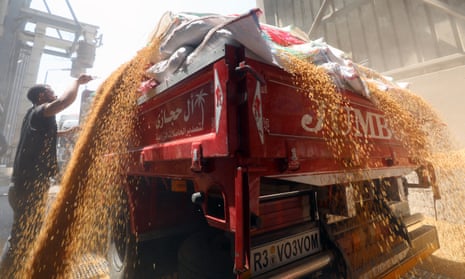The Kremlin has claimed shipments of grain will restart in the coming days from the Russian-occupied Ukrainian port of Berdiansk after work to de-mine the area, as its foreign minister, Sergei Lavrov, held talks with his Turkish counterpart.
However, the Turkish foreign affairs minister struck a more considered note, saying more talks between Moscow and Kyiv would be required to ensure the safety of any vessels carrying exports.
Speaking alongside Lavrov in Ankara, Mevlüt Çavuşoğlu described a United Nations plan to launch a sea corridor for Ukrainian grain exports as “reasonable” but added that Russia and Ukraine would have to accept any agreement.
“Various ideas have been put out for the export of Ukrainian grains to the market and most recently is the UN plan [including] a mechanism that can be created between the UN, Ukraine, Russia and Turkey,” Çavuşoğlu said. “We see it as reasonable.”
The majority of Ukrainian grain exports have been halted since Russia launched a full invasion in late February and blockaded the country’s Black Sea ports, through which 90% of trade from the world’s fifth-largest grain exporter used to flow.
The sudden export stoppage has raised concerns that the war in Ukraine will spark a global food crisis, and push millions of people into famine.
The UN subsequently appealed to Russia and Ukraine, as well as Nato member Turkey – which has authority over maritime traffic entering and leaving the Black Sea through the Bosphorus strait – to agree a corridor.
According to the UN, Russia and Ukraine supply about 40% of the wheat consumed in Africa, where prices have already risen by about 23%.
Any Turkish-brokered grain corridor would probably involve cargo vessels leaving Odesa, which is in Ukrainian hands, and other Black Sea ports with a Turkish naval escort, before travelling towards Turkey and on to global markets.
Lavrov, who has blamed western sanctions for the food crisis, said Ukraine needed to let commercial vessels leave its ports safely, in order to reach any agreement on a grain corridor.
Turkey, which has good relations with Kyiv and Moscow, made a show early in the war of trying to act as a mediator between the two sides but ceasefire talks have since faded.
Ankara has said it is ready to take on a role as part of an “observation mechanism” if any kind of grain export deal is reached.
An agreement between Russia and Ukraine is a vital starting point for grain exports to resume but several other things would need to fall into place.
Shipping industry insiders say Ukraine’s coastal waters would need to be de-mined with special insurance arranged and strict assurances given over the safety of vessels and crew before any shipowners would be willing to send a fleet to the Black Sea.
